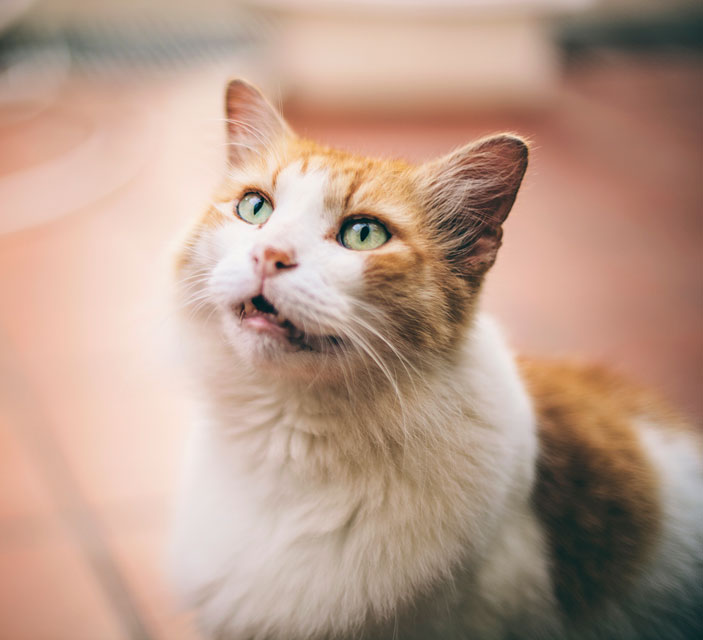How to Train a Cat to Be Quiet

Do you have a cat that meows more than you care for? It is possible to teach your cat not to be so noisy.
Why Does Your Cat Meow so Much?
Most of the time, cats vocalize to communicate with their humans. Some cats seem to be naturally more talkative than others, and some breeds (like Siamese) are bigger chatters than others.
Some cats meow for attention, treats, food, and anything else they may want. Others only meow for one specific thing…usually food.
If your cat never vocalized much before and suddenly begins meowing a lot, there may be a medical problem. Get an appointment with your vet right away.
Often, when a cat meows a lot, it's because people around her have reinforced that behavior. That may have been you or previous owners. If people react when a cat meows, either by answering or by responding with what they think the cat is asking for, it reinforces in the kitty's mind that meowing is appropriate.
Teaching a Cat to Be Quiet Takes Patience
The best way to train a cat is to ignore the behavior you don't like and reward the behavior you do want. In this case, that means ignoring your cat when she meows, waiting for her to be quiet, and giving her praise, rewards, treats, etc. when she's quiet rather than noisy.
When you're first starting the training, this technique will mean that you are waiting for very brief instants of quiet to reward your cat. As she begins to understand that she gets rewarded for quiet, you can wait for silence in longer stretches before giving the reward.
Clicker training can make this process go faster. You use a clicker to let the cat know she's done the right thing immediately upon a space of quiet. Then you give the treat. You can click faster than you can provide a reward, so clicker training can speed up cat training. Learn how to do it step-by-step here: "Clicker Training for Cats: An Overview."
Stay Positive During Cat Training
Cats learn best when they're rewarded for positive behavior changes, not when they're punished for a behavior you don't want. If you're engaging in a training session with your cat, remember to stay positive and patient. Your cat will get it eventually, but it may take a little time.
Also, remember that any reaction to your cat's meowing reinforces the behavior. That includes yelling, responding to the meowing by answering back, and giving the kitty something she wants while she's being noisy.
The Special Case of Nighttime Meowing
If your cat's meowing occurs only or mostly at night when you're trying to sleep, you may need to employ special training plans. That type of meowing often has to do with boredom that your cat experiences during the day or lack of getting out energy all day long.
If your cat never bothered you at night but is suddenly up pacing and yowling, there could be a medical problem. Get your kitty checked out right away.
The first thing to do if your cat tries to keep you up at night is to increase interactive play sessions during the day. Bump up your one-on-one attention to the kitty during the day. Give a main meal just before your bedtime to encourage your kitty to sleep after eating.
For more training tips for a cat that meows at night, check here: "How to Train Your Cat to Let You Sleep."
You May Also Like These Articles:
Clicker Training for Cats: An Overview
Siamese Cats: An Interview with Fancy Cat
How to Train Your Cat to Stay Off the Furniture
How to Use Clicker Training to Keep Your Cat off the Counter
Notice: Ask-a-Vet is an affiliated service for those who wish to speak with a veterinary professional about their pet's specific condition. Initially, a bot will ask questions to determine the general nature of your concern. Then, you will be transferred to a human. There is a charge for the service if you choose to connect to a veterinarian. Ask-a-Vet is not manned by the staff or owners of CatHealth.com, and the advice given should not delay or replace a visit to your veterinarian.





